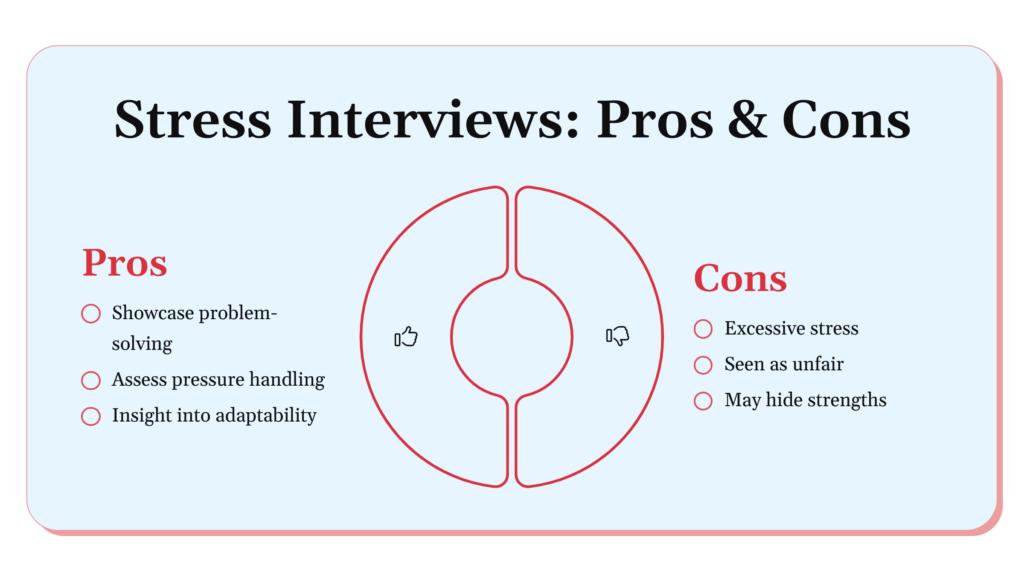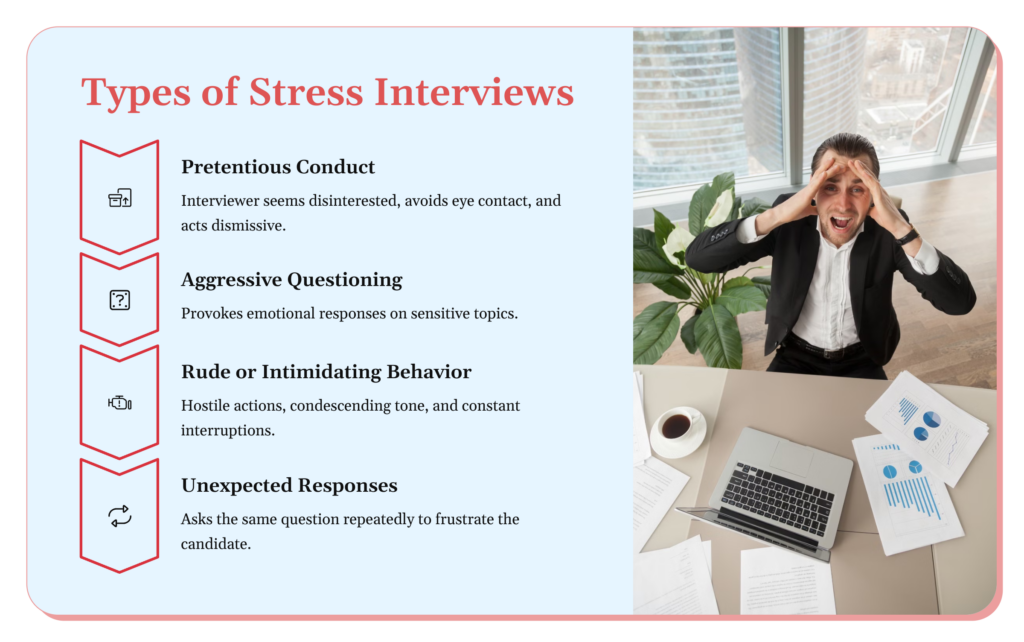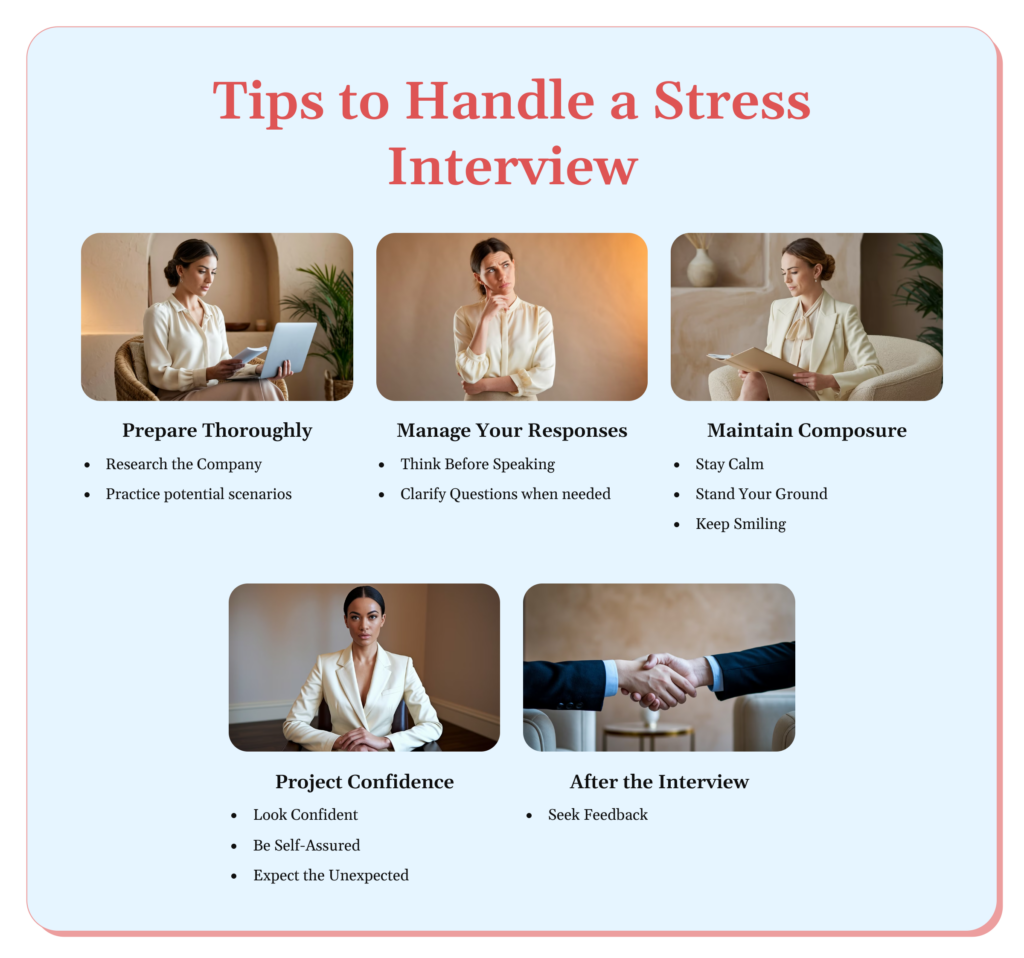
Quick Summary
Table of Contents
Stress interviews can be intimidating, especially for students preparing for job interviews. These interviews are designed to put candidates under pressure to assess how they handle stress.
In a stress interview, interviewers deliberately create a tense and challenging environment to observe how candidates react under pressure. The questions may be unexpected, aggressive, or thought-provoking, all aimed at evaluating the candidate’s ability to remain calm, think critically, and adapt to difficult situations.

A stress interview is a specialized job interview designed to assess how candidates handle pressure and challenging situations. In this type of interview, the interviewer intentionally creates a tense and intimidating atmosphere to observe the candidates’ reactions. They may ask difficult questions, interrupt frequently, or present tough scenarios, all with the intent of pushing candidates out of their comfort zones. The primary goal is to see how well candidates manage stress, maintain composure, and think quickly under pressure.
During the interview, candidates should be prepared for unexpected or challenging questions that require quick thinking and well-structured responses. Interviewers may also use negative body language or express skepticism to test the candidates’ ability to handle criticism and remain confident.
Ultimately, the purpose of a stress interview is to evaluate how candidates perform under pressure, assess their problem-solving abilities, and determine if they can handle demanding situations while making sound decisions.
In a stress interview, candidates face challenging and intense questioning designed to assess their behavior and reactions under pressure.

Also Read: Top 15 Online Business from Home Ideas to Amplify Your Earnings
Stress interviews come in various forms, often chosen by the manager based on what they want to assess in a candidate. Here are some common types:

In this type of interview, the interviewer appears disinterested in whatever the candidate says. They might engage in non-verbal actions that suggest they have more important things to do, such as shuffling papers, constantly checking the time, or texting on their phone. The interviewer will likely avoid making eye contact, creating an uncomfortable and dismissive atmosphere.
Asking aggressive questions is a key component of stress interviews. Here, the interviewer asks questions designed to provoke an emotional response, often focusing on sensitive topics like previous jobs, academic performance, or gaps in employment. The questions are usually framed aggressively, such as:
The purpose of these questions is to test how well the candidate can handle aggression and whether they can remain calm and composed under pressure.
In this interview, the interviewer may exhibit hostile or inappropriate behavior. This could include making the candidate wait for an extended period, speaking abruptly, or taking phone calls during the interview. They may ask difficult questions in a condescending tone, continuously interrupt the candidate, or ask them to repeat themselves multiple times. Sometimes, the candidate might face a panel of interviewers who take turns challenging them, creating an extremely stressful environment to see if the candidate will “break.”
This type of interview involves the interviewer asking the same question in different ways or multiple times, aiming to frustrate the candidate. The goal is to see if the candidate changes their answers under pressure or becomes agitated. This tactic tests the candidate’s consistency and ability to handle repeated questioning without losing composure.

The rationale behind stress interviews extends beyond mere assessment of job-related skills. In high-stakes roles where pressure is part and parcel of the daily routine, employers need assurance that candidates can maintain composure, make sound decisions, and remain productive under duress. Stress interviews also reveal critical soft skills such as adaptability, emotional intelligence, and conflict resolution capabilities.
Moreover, they help identify individuals who not only withstand stress but can also thrive and harness it to fuel their creativity and problem-solving skills. In essence, these interviews simulate challenging workplace scenarios to ensure that candidates are competent but also resilient and versatile.
Stress interviews are commonly utilized in various industries to assess candidates for specific roles requiring high resilience levels and quick decision-making. Here are some industries where these interviews are frequently conducted:
In healthcare, roles like doctors, surgeons, and nurses may undergo stress interviews. These are designed to assess how well candidates can manage emergencies and make critical decisions under pressure, which is crucial in life-and-death situations.
Stress interviews are common in management and consulting roles. The goal is to determine how candidates handle difficult situations, manage conflicts, and perform under high-pressure conditions, reflecting their suitability for leadership and decision-making roles.
In sectors like banking, investment, and finance, these interviews are used to gauge a candidate’s ability to manage financial crises and navigate market fluctuations. This helps employers assess whether the candidate can make sound decisions under stress.
Police departments and other law enforcement agencies sometimes conduct stress interviews to evaluate a candidate’s ability to stay calm, make quick decisions, and solve problems in intense and high-stakes situations.
In the aviation industry, stress interviews may be used for positions like pilots and flight attendants. These interviews assess how well candidates can handle emergencies and challenging situations with passengers, ensuring safety and professionalism.
The tech industry, particularly in fields like software development and cybersecurity, often involves high-stress environments. Stress interviews in these roles help employers evaluate a candidate’s problem-solving skills, ability to adapt to changes, and capacity to meet tight deadlines under pressure.
Stress interview questions can be tough and overwhelming, designed to test your composure and problem-solving skills. These questions may be uncomfortable, intimidating, or even confrontational. Employers use stress interview questions to evaluate how well candidates handle pressure and challenging situations, ensuring they can remain calm and think critically in high-stress environments.
These interviews often involve asking tough questions and creating a high-stress environment to observe how candidates react and perform under pressure.
Here are some sample questions and answers to guide you:
Sample Answer: “I took it as a learning opportunity. I reflected on the reasons and worked on improving my skills and approach to ensure I grow from that experience.”
Sample Answer: “I stay calm, assess the situation carefully, and find practical solutions. I believe in open communication and teamwork to navigate through challenges effectively.”
Sample Answer: “I see feedback as essential for growth. I listen to it carefully, analyze it objectively, and use it as a chance to improve both personally and professionally.”
Sample Answer: “During my last semester, I had multiple assignments due on the same day. I created a detailed schedule, prioritized my tasks, and worked diligently to complete each assignment on time.”
Sample Answer: “Once, a key team member dropped out during a group project. I quickly reassigned tasks, reorganized the team, and ensured we met the project deadline successfully.”
Sample Answer: “I maintain a daily to-do list and use calendars and task management tools. I prioritize tasks based on their urgency and importance to ensure that critical tasks are completed first.”
Sample Answer: “In my previous job as a customer service representative, I encountered a particularly upset customer. I stayed calm, listened to their concerns, empathized, and resolved their issue to their satisfaction.”
Sample Answer: “I view failure as a learning experience. When faced with setbacks, I reflect on what went wrong, identify areas for improvement, and use the experience to come back stronger.”
Sample Answer: “I believe in open communication and collaboration. I listen to all sides of a conflict, encourage dialogue, and work toward a solution that satisfies everyone involved.”
Sample Answer: “I prioritize a healthy work-life balance. To manage stress, I exercise regularly, practice mindfulness, and make time for hobbies and relaxation to recharge.”
Handling a stress interview can indeed be daunting, but with the right strategies and mindset, you can navigate it successfully and leave a positive impression. Here’s how:

Start by gathering detailed information about the company’s culture, values, and the specific role you’re applying for. This understanding will help you tailor your responses to align with the company’s expectations.
Take a moment to collect your thoughts before answering questions. This allows you to respond clearly and concisely, showing that you can think critically under pressure.
Simulate it by practicing tough questions with a friend or family member. This will build your confidence and prepare you for unexpected queries.
If a question is unclear, don’t hesitate to ask for clarification. Understanding the question fully ensures that your response is on point.
During these interviews, interviewers may challenge your opinions or present conflicting viewpoints. It’s important to stand by your perspective and provide clear, logical reasoning to support your stance.
No matter how intense the interview becomes, maintain your composure. Deep breathing and a focus on staying centered will help you remain calm and collected.
Good eye contact and confident body language, like sitting upright and maintaining a relaxed posture, can demonstrate your self-assurance and ability to handle stress.
A friendly smile can help diffuse tension and show that you can maintain a positive demeanor even in challenging situations.
Expect the unexpected. Stress interviews often involve hypothetical scenarios or surprise questions. Showcase your adaptability and problem-solving skills by staying flexible in your responses.
Approach the interview with the mindset that you are motivated by growth and success, not desperation for the job. This attitude will reflect your self-confidence and determination.
After the interview, ask for feedback to understand your strengths and areas for improvement. This can be invaluable for your personal and professional growth..
While stress interviews are designed to test limits, candidates should exercise caution if the interview becomes unduly aggressive or insulting. Professional interviews should be used to assess resilience rather than to humiliate or harass. If an interviewer’s demeanor becomes hostile or unethical, candidates have the right to challenge the approach or, if necessary, withdraw from the process.
After a stressful interview, reflecting on your performance can be quite beneficial. Identify particular instances in which stress management went well or where improvement is needed. Consider which methods were effective and what may be changed for future high-pressure conversations. With each experience, candidates can improve their ability to handle similar interviews and develop resilience.
Also Read: 9 Effective Strategies to Focus on Your Goal
Stress interviews can be daunting for job seekers, but with the right mindset and preparation, they can be successfully navigated. These interviews are designed to test how effectively candidates perform under pressure.
To excel in a stress interview, it’s important to stay calm and composed. Take a moment to think before responding, and aim to provide clear, concise answers. Preparation is key—research the company thoroughly, understand the job requirements, and practice common interview questions. Engaging in mock interviews and role-playing exercises can help simulate the environment and build your confidence.
During the interview, focus on showcasing your ability to handle pressure and demonstrate your problem-solving skills. Success in a stress interview requires not only answering questions effectively but also displaying how well you manage stress and maintain composure.
By applying the strategies mentioned in this article, you can increase your chances of success. Remember, with the right preparation and a calm approach, you can turn this challenging experience into an opportunity to shine and secure your dream job. Best of luck!
Ace your job interviews with tailored tips for a great first impression! Explore more Interview Tips with us.
A stress interview occurs when an interviewer poses intimidating or uncomfortable questions to observe how a candidate handles pressure and performs under stress.
It is necessary to remain calm and composed. Stay focused, maintain good posture, and actively listen to the interviewer. Take a moment to organize your thoughts before responding to questions. Display confidence and efficient problem-solving abilities. Remember, a stress interview is to judge your ability to handle pressure effectively.
Stress can be because of various reasons:
1. Work-related stress
2. Financial stress
3. Relationship stress
4. Academic stress
5. Health-related stress
Yes, working under pressure is a valuable skill in many professional settings. Employers often seek candidates who can handle high-pressure situations and deliver results despite challenging circumstances.
If your doctor orders you to have a stress test this can mean that you are having a cardiac or exercise stress test (often called an ETT or an exercise treadmill test), an echocardiogram stress test (often called Stress ECHO), or a nuclear stress test (often called a Walking Nuc or Nuc Test).
Here are some steps to help you prepare for your next stress interview:
1. Research the company – Understand its culture, values, and interview style.
2. Review common stress interview questions – Familiarize yourself with challenging scenarios.
3. Practice stress management techniques – Stay calm and composed under pressure.
4. Participate in mock interviews – Simulate real stress interview situations.
5. Seek feedback – Learn from practice sessions to improve your responses.

Authored by, Amay Mathur | Senior Editor




Amay Mathur is a business news reporter at Chegg.com. He previously worked for PCMag, Business Insider, The Messenger, and ZDNET as a reporter and copyeditor. His areas of coverage encompass tech, business, strategy, finance, and even space. He is a Columbia University graduate.
Editor's Recommendations
Chegg India does not ask for money to offer any opportunity with the company. We request you to be vigilant before sharing your personal and financial information with any third party. Beware of fraudulent activities claiming affiliation with our company and promising monetary rewards or benefits. Chegg India shall not be responsible for any losses resulting from such activities.
Chegg India does not ask for money to offer any opportunity with the company. We request you to be vigilant before sharing your personal and financial information with any third party. Beware of fraudulent activities claiming affiliation with our company and promising monetary rewards or benefits. Chegg India shall not be responsible for any losses resulting from such activities.